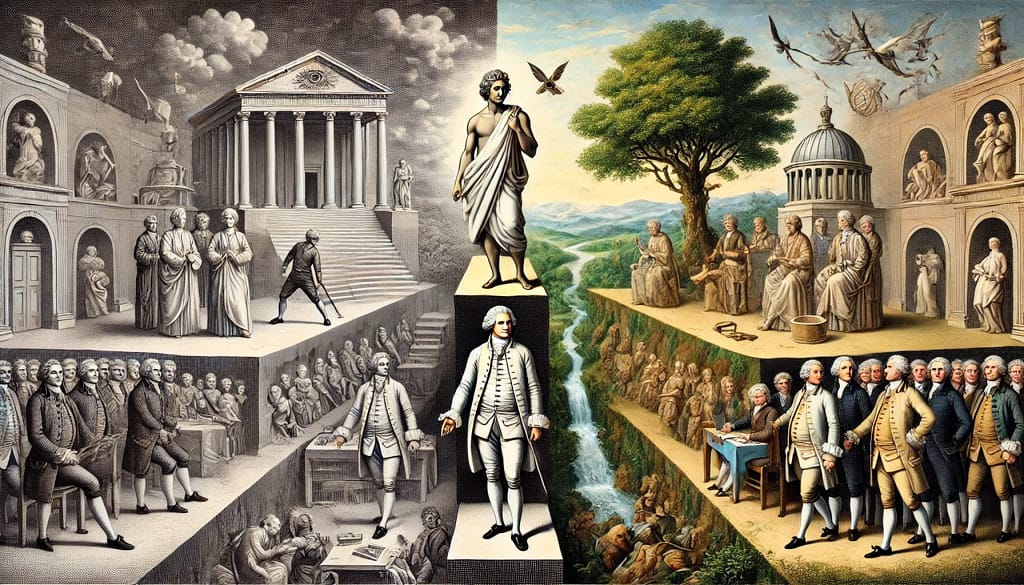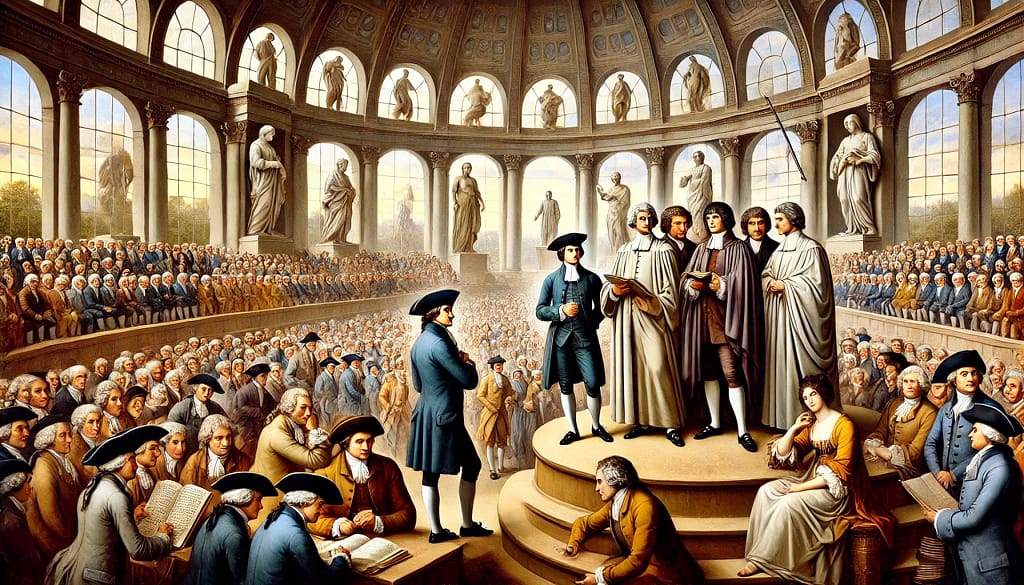Jean-Jacques Rousseau occupies a unique, almost iconoclastic position within Enlightenment thought. Unlike his contemporaries, who largely sought to replace divine authority with rational, secular systems, Rousseau challenged the very foundations of modern social structures, questioning if any single, overarching truth could truly govern society. His skepticism of elite-driven governance was as bold as his faith in the people’s wisdom—a faith that still resonates today and foreshadows the ideals of modern participatory democracy.
Rousseau’s philosophy presents a powerful contrast to the structured, hierarchy-laden models of thinkers like Hobbes, Locke, and Montesquieu, who favored a society led by a rational, educated few. These philosophers saw the “masses” as needing the guidance of an enlightened elite, an echo of Plato’s views on governance. By contrast, Rousseau trusted in the wisdom of the collective, introducing the concept of the “general will” as a unique, organic expression of society’s values. This vision of democracy as a natural force, arising from the shared voice of the community, was revolutionary in its rejection of traditional hierarchies and paved the way for modern ideas of direct democracy and popular sovereignty.

Rousseau: A Revolutionary Democrat in a Hierarchical Age
In an era where most Enlightenment thinkers deferred to religious and social hierarchies as stabilizing forces, Rousseau was a striking exception. His contemporaries, such as Locke and Montesquieu, saw governance as deeply entwined with religious morals, believing that divine or natural order justified the rule of a select few. Locke, for instance, viewed a property-owning class as divinely sanctioned to maintain stability and peace. For these thinkers, governance required a guiding elite, a view strongly influenced by religious tradition and inherited from Plato’s distrust of the masses.
Rousseau rejected this notion, arguing instead that true democracy required power to reside with all citizens, unrestricted by class or religious constraints. His famous declaration in The Social Contract, “Man is born free, and everywhere he is in chains,” underscores his belief that societal structures—often upheld by religious authority—restricted genuine liberty. In contrast to the idea that governance should be informed by a divinely sanctioned elite, Rousseau’s “general will” proposed a secular, inclusive approach, challenging not only the structures of power but the philosophical foundation underpinning Enlightenment elitism.
Rousseau vs. the Enlightenment Elite: Challenging Religious and Political Hierarchies
Rousseau’s vision of democracy as a secular force driven by collective will starkly contrasts with the hierarchy-embracing models of his contemporaries. Most Enlightenment thinkers saw religion as essential to governance, often believing that its moral structures provided stability and order. For example, Locke’s concept of governance as a social contract assumed a divinely supported ruling class that protected property and peace. Montesquieu also supported the separation of powers but believed these powers should be held by individuals molded by tradition and guided by education.
Rousseau dismantled these assumptions, advocating for a democracy where power emanated directly from the people, unhindered by elite or religious oversight. To him, religion was a private matter; democracy’s legitimacy came from the active, unmediated participation of all citizens. This secular approach to political power resonated with Protagoras’ myth, which held that all people possess an inherent capacity for justice and civic participation. Rousseau’s model, unlike those of his contemporaries, embodied a radical shift—a call for governance led by the people themselves, free from inherited privilege or divine sanction.

Foreshadowing Postmodern Thought
Rousseau’s secular and egalitarian ideas were ahead of their time, foreshadowing many themes in postmodern philosophy. Michel Foucault’s critique of power structures, for instance, resonates with Rousseau’s concerns about how hierarchical traditions restrict freedom. Foucault argued that societal institutions—often sanctioned by religion or tradition—embed authority into daily life, thus constraining human agency. Both thinkers distrusted traditional authority, seeking systems that would empower individuals rather than control them through inherited structures.
Similarly, Jürgen Habermas’ theory of communicative action, which emphasizes the importance of open, uncoerced dialogue in a functioning democracy, aligns with Rousseau’s concept of the general will. Habermas viewed democracy as thriving in an environment where citizens engage in free, participatory dialogue—an idea that mirrors Rousseau’s call for active civic engagement, free from hierarchical limitations. Both thinkers see democracy as grounded in the collective participation and dialogue of citizens, rather than being led by an elite or guided by tradition-bound structures.
Digital and Direct Democracy:Modern Reflections of Rousseau’s Vision
Today’s digital platforms, such as eDemocracy, provide a direct channel for citizens to participate in governance without traditional hierarchies, breathing new life into Rousseau’s ideals. These platforms reject the elitism inherent in representative systems, enabling individuals to contribute their voices in real time. In this sense, e-democracy serves as a bridge between Rousseau’s radical philosophy and modern technology, transforming the “general will” from a theoretical concept into a tangible, active force that shapes policy and society.
Unlike traditional governance, which still carries the legacy of Enlightenment-era hierarchies, eDemocracy empowers individuals regardless of status or tradition, creating a system where every citizen’s voice matters. Projects like eDemocracy offer an inclusive approach to governance, enabling people to engage without deference to elite or religious oversight. This democratization of power brings society closer to Rousseau’s vision of a democracy truly by and for the people.
Conclusion: Embracing Rousseau’s Vision in the Digital Age
Rousseau’s philosophy challenges us to reimagine the true potential of democracy in the 21st century. He envisioned a world free from the constraints of tradition and hierarchy, where governance reflected the collective will of the people rather than the dictates of an elite few. In this sense, Rousseau was not only a revolutionary thinker of the Enlightenment but also a forerunner to postmodern critiques of hierarchy and authority.
Digital platforms like e-democracy fulfill this vision by creating spaces where citizens can engage directly in shaping their communities and societies. As eDemocracy grows, it honors Rousseau’s call for a society led by the people, a world where every voice has the power to make an impact. In embracing these innovations, we find ourselves revisiting Rousseau’s radical vision—a democratic ideal not bound by tradition or elite control but open, inclusive, and continuously shaped by those who participate.